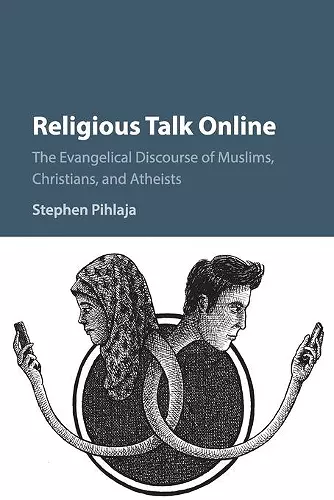Religious Talk Online
The Evangelical Discourse of Muslims, Christians, and Atheists
Format:Paperback
Publisher:Cambridge University Press
Published:17th Sep '20
Currently unavailable, and unfortunately no date known when it will be back

Original research that explains how religious conflict is played out on social media.
In the online world, people argue about anything and everything - religion is no exception. This book explains how and why religious conflict occurs online and how people of different religious beliefs interact on social media. It will appeal to researchers and students in sociolinguistics and discourse analysis, particularly those working on social media and religious language.In the online world, people argue about anything and everything - religion is no exception. Stephen Pihlaja investigates how several prominent social media figures present views about religion in an environment where their positions are challenged. The analysis shows how conflict creates a space for users to share, explain, and develop their opinions and beliefs, by making appeals to both a core audience of like-minded viewers and a broader audience of viewers who are potentially interested in the claims, ambivalent, or openly hostile. The book argues that in the back-and-forth of these arguments, the positions that users take in response to the arguments of others have consequences for how religious talk develops, and potentially for how people understand and practice their beliefs in the twenty-first century. Based on original empirical research, it addresses long-debated questions in sociolinguistics and discourse analysis regarding the role of language in building solidarity, defining identity and establishing genres and registers of interaction.
'Pihlaja's study is valuable to sociologists of religion for his insights into atheism and modes of proselytism, and his in-depth qualitative study of discourse dynamics makes a compelling argument to sociolinguists that 'social media offers a uniquely transparent, public, and immediate view of how people talk about religion'.' Michael Munnik, Discourse & Communication
'Pihlaja's book is a promising attempt to analyze the field of religious discourse online from a novel perspective. With his background in linguistics, Pihlaja's approach is a welcome addition to the existing body of research from media studies, religious studies, and theology. His book is innovative in its inclusion of atheist voices, as well as in the historical contextualization of patterns of interreligious dialogue, which would deserve a study of its own. With regard to methodology, the incorporation of corpus linguistics is definitely an approach that seems fit for online discourse data. Hopefully, this study opens the door for further in-depth engagement with digital methodology in the study of religion online.' Frederik Elwert, Journal of Religion, Media and Digital Culture
ISBN: 9781316610183
Dimensions: 230mm x 153mm x 10mm
Weight: 300g
196 pages